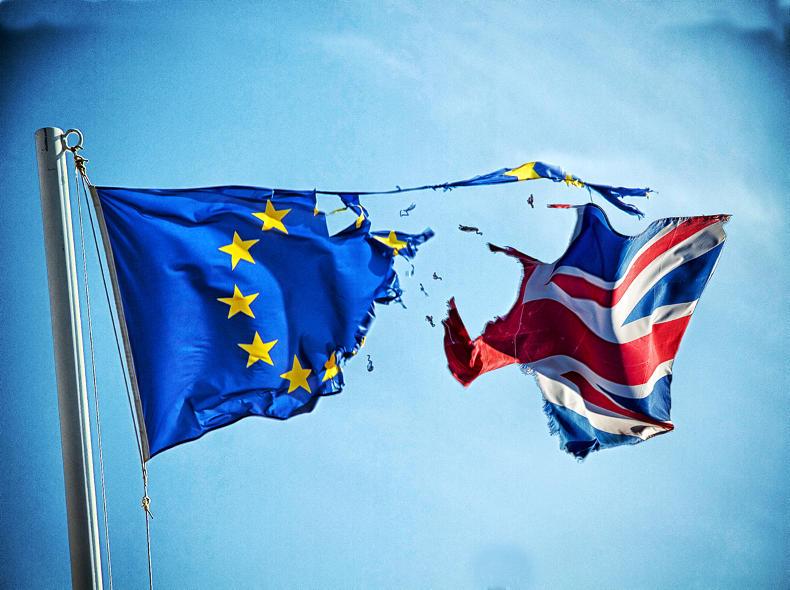The announcement by British prime minister Teresa May that she will trigger Article 50 in the first quarter of next year is the last but one step in the UK withdrawing from the EU. It is expected withdrawal will follow within two years, though this can be extended if the remaining EU members all agree to do so. It now requires an act of parliament, which will be the final UK step prior to notification. This should not be an issue, as the prime minister has a comfortable majority in parliament. However, it is no secret the Conservative party is deeply divided between leavers and stayers, so the possibility of a party revolt cannot be ruled out completely.
Assuming it goes ahead as planned, it will have once in a lifetime implications for Irish farmers both sides of the border. Currently farmers in Northern Ireland and Britain are experiencing a currency-driven windfall. Commodity prices have increased on the back of weaker sterling, while the CAP payments will be delivered this year on an exchange rate of 85p=€1 compared with 73p=€1 last year.
The issue for NI farmers is what type of support the UK government will provide for farming post-Brexit. The optimists’ view is that the money saved from the UK contribution to the EU allows continuation of payment at present rate into the future. Others suggest that the powerful health and education lobbies will be too demanding and will eat into this payment as well as the rest of the net €10bn the UK will not be sending to Brussels.
Money pot
There is a also the question of how and what the UK government will choose to support and will they have a general UK-wide policy or will a pot of money be sent to the regional parliaments for local decision-making given that agriculture is a devolved matter to Scotland, Wales and NI. The unseemly wrangle in Stormont around welfare payments, the last big budgetary matter they dealt with, means uniform cross-party thinking on the type of support for agriculture cannot be taken for granted.
Many farmers expect a cutting of red tape as a benefit of leaving the EU and this was the driver of many farmers’ decisions to vote leave. However, the UK government is going to transfer all EU laws into UK law and will change as they go along. That means a case will have to be made to relax red tape, welfare or environmental standards. That will not be easy. Already, the environmental and welfare lobbyists are actively encouraging that any farmer payments be subject to enhanced standards, not relaxed. One such example from what would not be considered a hostile lobby to farmers was the British Veterinary Association saying: “Any public money to replace the EU Common Agricultural Policy (CAP) should be used to support and incentivise public goods, encompassing at least animal health and welfare, disease surveillance, biodiversity and environmental stewardship.”
Blank page
The farming unions in Northern Ireland and across the UK have a major job to do ensure a UK farming policy which starts with a blank page is shaped in a way that supports real sustainable farming.
At a practical level, NI farmers will be looking for the best possible trading arrangement to maintain normal trade for a third of milk production and almost half of lambs to go south for processing. That remains to be negotiated but the soundings of migration being a UK red-line issues does not bode well for free access to the trading area, like Norway currently enjoys.
South of the border
As for farmers south of the border, it is purely a question of market access that is the concern as well of course as a loss of €10bn from the EU budget and how that might affect future CAP payments.
A tariff on Irish exports to the UK would be a disaster, as is the longer-term likelihood of UK trade driving deals with the Mercosur countries, the US and Australia and or New Zealand. Beef and cheese are the most exposed commodities, with dependency on the UK market for in excess of half the production.
More Irish beef and cheese is consumed in the UK than in Ireland.
These markets cannot be easily replaced and Ireland is more vulnerable in this respect than any other EU member. It is why Ireland thought long and hard about joining the euro at the beginning of the century and now a harsh reality beckons. There is virtually no chance of a special trading deal for Ireland though the movement of people issue is more likely to be resolved.
The Irish brand
Ireland needs to use the negotiation window to build the brand value of Irish products with serious marketing support to offset the less favourable trading arrangement that is likely to emerge. New markets have to be opened with increased urgency as well, but the UK will continue to be the major outlet for Irish beef, however difficult or easy it is to trade there. The issue will be increased difficulty means less value returned to Irish farmers. But such is the strength of that market, costs would have to increase dramatically to cause Irish exports to switch elsewhere.
